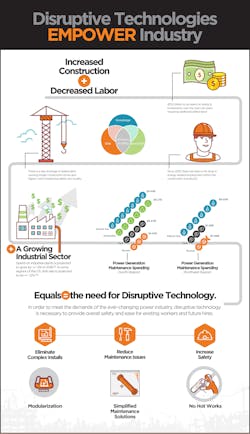According to recent industry insights and forecasts, $350 billion are expected to be spent in the U.S. on builds and investments over the next two years, which will require additional skilled labor. Meanwhile, the expected employment growth for maintenance workers, according to the U.S. Bureau of Labor Statistics, is only 6 percent between now and 2026. This shortage creates a dangerous gap in skilled labor to keep up with the demand. It is difficult to get a plant back online quickly and safely without a team with the appropriate knowledge, skills and bandwidth needed for fast and efficient work.
Increased construction plus decreased labor
In addition, construction is facing a dire shortage of craft labor due to an aging, skilled trade workforce and lack of younger workers entering these fields. According to the American Welding Society, the average age of a welder is in their mid-50s with more than half of the workforce nearing retirement. Also, research conducted by the Construction Industry Institute notes this lack of skilled labor not only leads to longer construction schedules and higher costs but threatens overall safety and quality at a jobsite.
The numbers show that keeping the industry viably staffed with craft labor is ominous. The need to attract and develop talent, improve efficiencies, reduce costs and enhance worker safety at construction sites is imperative now more than ever. Ultimately, owners and engineering, procurement and construction firms (EPCs) seek project certainty.
Plus, a growing industrial sector
Spending on industrial plants, including maintenance work, is projected to grow by almost 6 percent in 2018 alone. In some regions of the U.S., that growth rate is projected to be as high as 12 percent. In fact, power generation maintenance spending across the country in multiple sectors including natural gas, renewables, coal and nuclear totals nearly $40 billion.
Equals the need for disruptive technology
Disruptive technology and disruptive concepts like modularization has contributed to the speed and certainty of construction projects and addresses the challenges of inefficiency, scheduling, cost and safety and engineering and procurement. Increasingly, companies look to rely on the expertise of others in their manufacturing and supply chain. Construction companies and EPCs are exploring proven approaches from other industrial construction markets, e.g., mining, oil and gas and water/wastewater, such as lean construction, upfront manufacturer expertise integration, offsite fabrication, modularization, simplified material handling and onsite module installation.
However, this requires a different way of thinking and higher level of coordination among owners, engineers, EPCs and suppliers. Imposing these proven approaches and standardized processes to the power industry can drive productivity, efficiency and quality.
Furthermore, simplified solutions with no hot works and prefabrication allow for less skilled labor and strengthen opportunity for quicker installation. To meet the demands of the ever-changing power industry, disruptive technology is necessary to provide overall safety and ease for existing workers as well as future hires.
The industry must start embracing new technologies, new methods, and developments like modularization. All of which are concepts that help deliver certainty and efficiency that the construction industry has been lacking for 25 years.
Jim Renner serves as vice president – sales at Victaulic, a global designer and manufacturer of mechanical pipe-joining system solutions. Renner is responsible for the company’s global power, water, wastewater, desalination and infrastructure markets. Prior to joining Victaulic in 2002, he held marketing leadership positions with companies in the architectural, construction and building products industries, including Lutron Electronics, UGI Utilities, TK Theaters and Domus Advertising. Renner is a member of the Construction Industry Institute Marketing Committee and the Manufacturers’ Alliance Marketing Council (MAPI). He is also a graduate of the Mechanical Contractors Association of America Advanced Leadership Institute.
Graphic courtesy of Victaulic.

